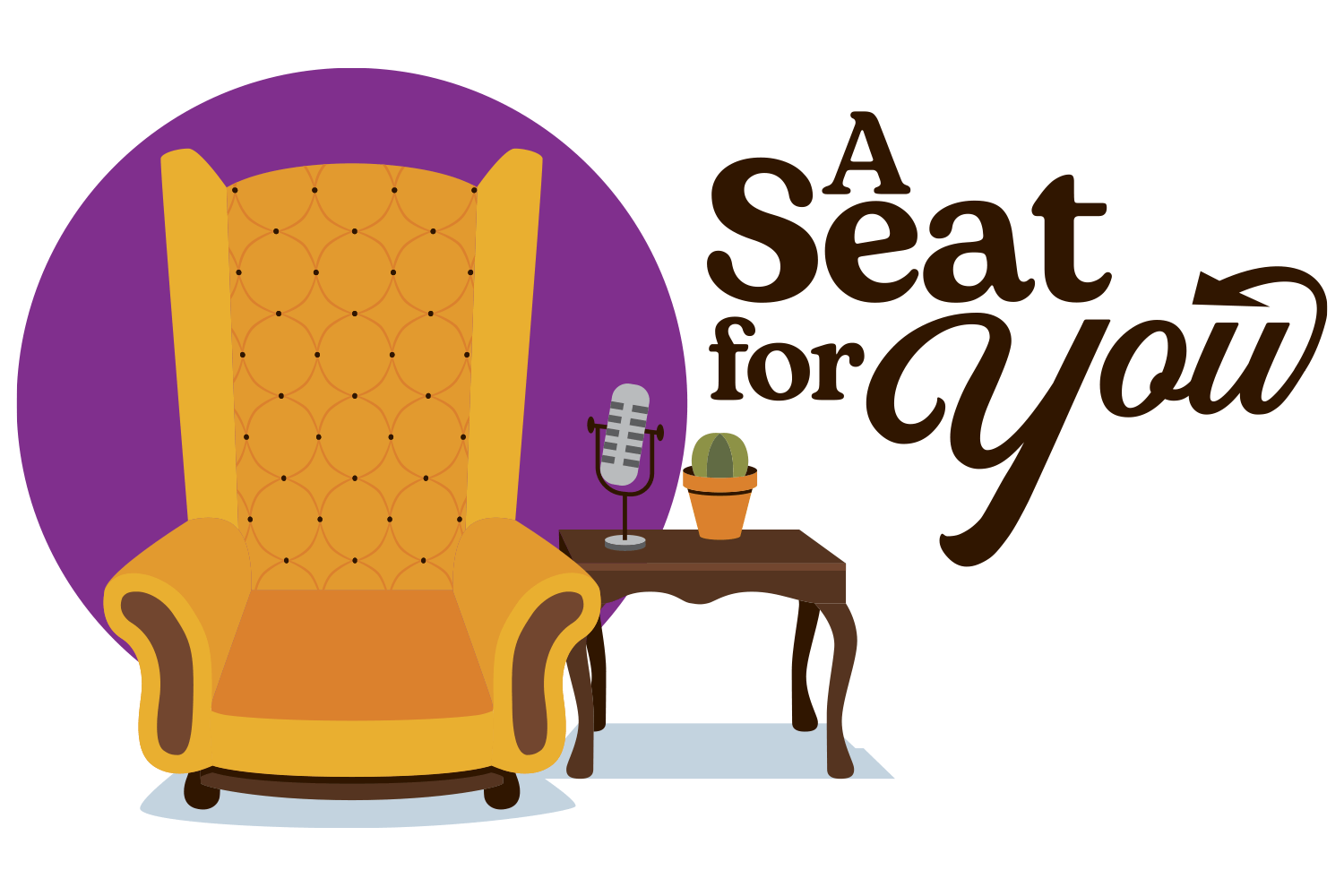Episode 9: The results are in and the answer was YES
Leslie: Hear ye, hear ye, another episode of The Seat for You. No.
April: The Seat for You?
Leslie: I was confused. A Seat for You podcast. I'm one of your hosts, Leslie
April: And I'm the other one. April, yo mama.
Leslie: Yo, wow. Alright, so, um, yeah. The last episode. The last episode was, uh, a little intense. We got, uh, immediate reaction like we've never received before from, uh, from friends and family and acquaintances and other listeners.Messages. Yeah. So, um, April, do you want to kind of recap? The last episode, briefly,
April: like. Well, that wasn't in the list of things to do. Recap the whole last episode? Well, no. Our longest episode yet? You want me to just recap it?
Leslie: No, I'm saying. On the fly? I'm saying, set the scene for the people. Okay. You had the, you had the run in with the principal's office at your last religious establishment.
April: Yeah, I shared.[00:02:00] Involving some personal property that was confiscated and never given back, um, regarding just some assumptions of things and the common reaction was really, uh, anger and
what's the word, dumbfoundedness, I guess. People were angry and dumbfounded. Yeah. Um, and that was, those were the reactions basically. And so I was talking to Leslie about this earlier and you know how when you're watching a documentary about a cult, you're sitting there thinking, how could somebody believe this?
How, how were they sold on this type of life and how did they get there? Like, what's wrong with [00:03:00] them that they would concede to all of this? And the reactions from this past episode were that of like, what I ask when I watch documentaries about cults, they were the same reactions, you know, like, how could people do that?
Like,
Leslie: it was shock and awe. Yeah. Yeah. Uh, I got, um, a message from a friend that was just, you know, That basically said, you know, she was just angry listening to this episode, especially about the part where, uh, I was being judged for my hair. Um, and it, it is just disturbing, you know, kind of what, what goes on.
So, I mean, I remember asking the question last episode about, you know, weigh in, if you. If you think [00:04:00] that was a toxic environment or perfectly fine, I think you got your answer. Yeah.
April: I'm going to say I think I got my answer Um, and today at the Dunkin Donuts, Leslie's on a meeting. I'm on my computer doing some work things and there's this older guy.
Um, he's in there kind of just talking to everybody and he passed our table and kind of stopped, looked at me, looked at Leslie and put a card A business card down on the
Leslie: table. No, let me pause you for a second. He didn't just look at me. Like I'm literally on a zoom meeting, discussing something very important, like engaged in conversation.
And I see this older gentleman and I mean, pretty older, like early eighties. Um, like standing next to our table. Like bent over like trying to
April: I thought he was gonna ask me a question.
Leslie: Yeah, like look me in the eye Like I'm [00:05:00] engaging in a conversation and you've got somebody like trying to Interject themselves into our space for sure,
April: right? He just threw the business card down on the table And he's like you should join us sometime or I forget what he said, but I read the card. I Have it.

Leslie: Yeah, and I, and I just continued on about my business because I didn't know what was going on. And so, after I get off the meeting, uh, April shows me this card. It's quite...
April: Well, you were out. This came. Yeah. Um, and on the back of it, it's “free video answers to life's questions.” And it's like, like all kinds of things. Evolution, evil…
Leslie: Well, first, why don't you say where, where the card's from?
April: I don't want to blast the church. Okay,
Leslie: well, but it, but it's a church. It's a business card.
It is a church, yes. For a, for a Southern Baptist church.
April: Yes, it's a Baptist church. [00:06:00] Baptist church. So he took one look at us and said, they need Jesus.
Leslie: Well, but the, the, the funny thing is, is on the back of this card, it, you know, so picture a regular size business card, alright? These are like two and a half by three.
Something like that. And there is, let's see, four, there are 24 little boxes that look like little TVs, think of little YouTube thumbnails, um, on the back of this small business card and just a few of them. Uh, cause like, like April was just saying free video answers to life's questions, uh, abortion, depression.
Ooh, there's evil. Evil's on here. Yeah. Um, salvation, sexuality, and then in a separate box homosexuality. So apparently, Um, [00:07:00] also pornography. Uh, the Da Vinci code, which I was kind of interested in that.
April: apparently that's, that's different.
Leslie: I was like, Hmm, there's, there's some answers to that. Um, evolution. I would be very
April: interested to hear what they have to say about that.
Now we've not listened or watched into any of these.
Leslie: Oh yeah. No, we're making complete assumptions.
April: Right. So we're doing the same thing that they did. So, right.
Leslie: But, but my thing was what I wanted to bring up is you have somebody who is. So hell bent into interjecting their agenda onto someone else. And, and, you know, you and I had this conversation immediately after, because of course you were like, well, I don't know if my, my Enneagram nine over there, I can see all sides.
I don't know if they were pushing an agenda. And I said, okay, let me put it to you another way. Have you ever been sitting at a table? [00:08:00] And maybe a drag queen comes up with a rainbow sticker and there are a pamphlet that says, you know, 16 ways to be gay and, and, and throws it down on the table and says, you should come join us.
Okay. That is, that's pushing an agenda. All right. So all of, all of this. Manufactured outrage that we talked about in a previous episode of the gays pushing an agenda on our kids and all this kind of stuff. I'm sorry, but you speak into a mirror. And so all of these religious folks that feel it's, it's their right to come up to strangers sitting in and like minding their own, we were literally minding our own business.
And to assess us, because that's what [00:09:00] happened, there was an assessment made, and then to feel they needed to pull out this card and plop it on the table. I'm sorry, but that is pushing an agenda. So I'm very thankful to Jesus, God, Mother Nature, whoever.
April: Octavia Spencer.
Leslie: Yeah, Oprah Winfrey, that I was on a zoom call and I was not able.
April: I kept looking at you like, is she seeing this?
Leslie:Yeah. Like I was, I, I was protected from this, um, interaction because who knows where that could have went? You know, like, I'm not sure at this point that I, I can hold my tongue for certain things like this. I mean. I don't know. So anyway, that [00:10:00] just happened today.
Yeah. And, uh, you know,
April: it's just, we can't escape.
Leslie: It's fun. It's fun living here in Florida. I'm sure that happens other places too, but I mean, I know that that's the thing. I'm sure you were thinking immediately. “Well, that's what we're on this earth to do. “
April: Why would you think that I was thinking that immediately?
Leslie: Because you have been brainwashed about spreading the seeds of Jesus.
April: That, I don't like it when you say it like that. Well, what? I don't like Isn't
that what it is? I don't like the phrase of spreading the seeds. That's just, it's gross.
Leslie:Well, what is it? Planting the seeds?
April: Planting the seeds sounds a lot better than spreading the seed.
That's yucky.
Leslie: You can see how Now, yes,
April: I understood. again. Where he was coming from because I've been there. You know what I mean?
Leslie: Right. I mean, I remember you wrote the letter to the girl with all the Bible verses. Yes. Yeah, because that's what I, let's talk about that. Right? That's what I'm talking about.
Like, like [00:11:00] y'all feel that.
April: Can you not say y'all? 'cause I feel like I am not a y'all anymore.
Leslie: Okay. There are certain people within Christianity who feel. It is their responsibility to spread the word. Is that better? And spread words. Okay. And to, I mean, we've been approached before in a park. We've seen people getting approached in parking lots at Costco.
April: I was wanting them to approach me on that one. Yeah.
Leslie: Like, I mean, it's, it's happened. Today's incident, like it, it happens all over the place. Why? And, and you brought up a very good point about salvation and what it actually says in the Bible about you coming to your own, like,
April: it's your own, it's your decision. It's a personal, it is a personal choice.
Leslie: Right. [00:12:00] And so I don't, I don't understand the hypocrisy of these groups. Sitting here trying to say that other people are pushing their lifestyle on to them. Yet, that is exactly what they are doing on a regular basis. Yeah.
April: I don't know what to tell you, but... So, in short, we appreciate all your responses.
Leslie: Yeah. Sorry, we got sidetracked there.
April: And, um... Um, it's, you know, it's helpful going forward because it's, it's helpful to know that one, I'm not alone in thinking that, you know, things are off and apparently they're a lot more off than I even realized.
[00:13:00] But anyway, um, we hope to have more conversations like that with you guys and, um, in the future.
Leslie: Yeah. Um, In another emotional episode, we discussed, uh, your, uh, identity as a mother and how that was going to change as your, your children are aging and, uh,
April: yeah, that was the one I cried on like a big ole baby.
Leslie: Yeah. And, um, it's so funny because I, I thought immediately doing this podcast, I would be the one in tears all the time. Cause I. I'm the one who wears my emotions on my sleeve, I can cry at the drop of a hat, and I thought it would be me immediately. But it's been you twice.
April And I'm usually the one that's like, you're fine, it's fine.
Leslie: No emotion. But I think..
April No emotion?
Leslie: Well, I think you're allowing emotion to come, like you're, you're evolving as a human, so these emotions [00:14:00] are coming out because you're feeling like safer to allow them to come out. So, but anyway, in that episode, we talked about how Jen Hatmaker was going through the same thing, but she was super stoked about her kids leaving.
Like, she was like, peace out, bye, bye Felicia. And uh, we said, Oh, maybe we should ask her cause we're going to go see her. Right. She, she was doing a, a live performance, um, with, with Tyler Merritt, her boyfriend. Um, and so. Last night, we went and saw this performance, and that was actually a question that was asked of her from the audience.
That exact, that exact question. And so we got, April got our answer. Yeah. So, do you remember what the answer was?
April: Well, she was pretty stoked about it. That, I mean, there wasn't, she didn't, she didn't, uh. Go into a lot of advice as [00:15:00] far as that goes because she's been pretty excited about it. She has five children and It's and she's been, you know, kind of by herself.
And so she's kind of like ready for that next era so she's excited about the next chapter and excited to dream again and have you know, things to look forward to and think goals of her own and things like that so and I'm kind of in the same spot where Um, I'm able to allow myself to have goals and, um, dreams for the future.
So I'm kind of in that space too, to where it's not like they're going to, they're going to leave the house and I'm just going to be here staring at a wall. I'm going to be busy pursuing things that make me better as a person. So
Leslie: it was, um, ironic that, you know, you you're doing the work that you need to do to.You know, kind of tackle whatever the next career is that you decide to, you know, go on. And I've also [00:16:00] made some personal choices about, you know, maybe going back and, and getting the college degree that I never got because went straight into the workforce. And, you know, which I think the experience of doing that is fabulous if you can get it.
I mean, I learned so much on the job, um, you know, how to, how to run a. 100 million plus business and how to manage a lot of employees. And, you know, those are, those are invaluable skills that a book or a classroom is not, they're not going to teach you. Right. Right. But I do understand that in certain spaces, there is a value in that paper certificate.
And you know, I, I just. Thinking about what that would look like for me at 49 years of age now to go back. And, you know, I technically still have, you know, basically three more years [00:17:00] left. I, I only went like, like 30 something credits. So, I mean, it's, it's not going to be easy road, but, um, you know, we'll see how that happens.
So like you were saying, it's kind of ironic that we might be going on these educational journeys at the same time as well.
April: We're gonna go study at the coffee shop, like the kiddos do.
Leslie: Right, I can't wait to run into more old white men.
April What do you mean?
Leslie:See what kind of business cards they want to give me.
Oh. Yeah. Yeah.
Get your, just go in and get your donut and go. Right. Like, just get your donut and get back in the car.
April: You don’t own the Dunkin
Leslie: Yeah. Anyway. So those are some, uh, updates, recent updates, breaking news. On the last couple of episodes, so, all right, let's get on to our topic for this week.
April: Well, we wanted to kind of go back a little bit and share how and why these conversations came about.
[00:18:00] And what made us decide to start recording these conversations. And so, it all started four score and seven years ago. No, it was like, what, four maybe? I was gonna say three, but it's been more than three.
Leslie: Yeah, it was probably the end of, um, 2019.
April: Yeah, it was before COVID, I think, right? Yeah. Okay. And we would be doing like, let's say just like house projects.
I remember us working on the shed. The kids have an art shed that we, um, finished out on the inside. We put insulation in and AC power, all the things. And we did, um, everything except the electrical and AC we did on our own. And
Leslie: I was going to say, don't like make it sound like we're some super handy lesbians or anything.Like I don't know how to do electric or plumbing or AC work.
April: But we did the first, we did paneling and insulation and we did a darn good job.
Leslie: Oh [00:19:00] yeah, we did a lot. We
April:. And so it was in during this project that we just started talking about, um, church and Leslie would ask me questions about certain things that, um, involving the Church and God and stuff like that. And, um, she would sometimes ask me questions that I did not have answers to. And it made me question, like, why don't I know? These are basic. Some of these questions are super basic. And like common sense questions where if you like grow up in church, sometimes these questions are just kind of like, um, rolled over because you kind of move on to all the high points.
And you learn all the, you know The key Bible verse is growing up, but you don't actually learn details such as timelines or, um, the actual logistics of some things that make zero sense whatsoever.
Leslie: Yeah, like one example would be, um, if Adam and Eve [00:20:00] were the first people on this planet, then who was there to document that?
Who was writing the story? Because the story isn't written by Adam or Eve. And if Adam and Eve are the first people on the planet, that means... Everybody's been made from incest. Yes. That's just gross. Well, first off, if that's just not, it's not real as a story,
April: but I mean, that can be a whole nother discussion, but I do believe we came from two people.
Leslie: Oh, then. Yeah. We're going to do a whole episode on that. Anyway,
April: um, so it's questions like that, that we got started talking and it just kind of evolved into. More questions and kind of trying to share with Leslie how Jesus and the church are completely different even though we're supposed to replicate Jesus.
It's not that way most times at all and that was very confusing to her like what's the point then [00:21:00] and it really convicted me as like I I don't know why is it like this and so It really just started a whole chain of events and questions and digging and learning on both of our parts and,
Leslie: um, Yeah, cause I really like history and so I like the timelines.
Like I, I like to see what is documented in history books and things like that. And, you know, April was like, Oh, well there are things in the history books that relate back to the Bible and such. And so. I was like, well, let me, let me check this out, you know, and looking at the Roman empire and, and all the different things in the timeline on that, you know, to me, that kind of stuff is fascinating.
So whether you believe in Christianity or Jesus or anything like that, the fact that there is history, you know, of thousands of years ago, that's been documented. And that was something that I think gave us [00:22:00] a foundation of something to talk about. Because, you know, I think I've mentioned before, like, I'm not someone who was raised in that environment and just seeing, seeing what quote unquote religious people acted and how they acted to people like me.I was like, I don't want to be a part of that at all. Like that is not for me.
April: And I've always known that that was not Jesus. Yeah.
Leslie: You, yeah. And,
April: but I didn't. Well, even so, even knowing that, I mean, I've known for, you know, my whole life that the people that act like that are not representing Jesus at all.
And yet I still was one of them, right now. That's like, why, why? Yeah. And so you made me really question that and really look, you know, deep into things and. Then we started watching The Chosen, which is fantastic. If you haven't [00:23:00] ever watched it, it really, it really brings to life some of the stories and characters and personalities and makes, it makes things make sense and it's, it's really good.
Leslie: Yeah. I mean, I would say again, from somebody who is not raised in this and not someone who can quote verses and. And everything like watching the chosen gave me a different perspective over the stories and the people. And again, I, I like the visual. So even though it is a dramatization, you know, you pointed out very early.
And we'd watched some like behind the scenes stuff and interviews with the makers. And, you know, they, they had said that they were. They were going straight out of, of the Bible and following it.
April: There were many times when I would bring out a Bible and literally follow along in the story. And they were, [00:24:00] they were very, very, very close to the story.
They did not alter the, like, point of any story at all. The only thing that would have been, um, theatrical would have been just like, you know, the personalities and... You know, little quirks that some of them may have had based on their writing styles or, uh, the stories told in the Bible about them. Um, like Matthew being, uh, very meticulous and possibly on the spectrum and, um, cause the way that he writes Matthew is intricate and detailed and it doesn't leave out a whole lot.
So, it's, it's just great. So if you haven't, if you haven't started it, it's, it's really, really cool. Um, but those episodes got us talking a lot more.
Leslie: Well, it gave me a new perspective, um, because it made it more real, you know, and...
April: Well, it [00:25:00] made you more open to learning about Jesus, whereas the church closes it off completely.
Leslie: Right. And, and, and the, I guess the key thing there of what I saw is... It wasn't filled with hate. Not at all. It wasn't pushing an agenda. Right. You know, and that was the thing that, cause, trust me, if I would have sat down and watched this show, and I was picking up the vibes of something creepy going on, I would not be watching this.
April:It wasn't like, it's not a cheesy church acting, Yeah. uh, film. It's high quality,
Leslie:not like a nativity scene, you know, a little drive through nativity scene. Not like that. It means it's like, you know, it's a really, uh, it's a high quality production and, and you get to understand the characters and understand, like, I, I never really even knew about how the books of the Bible were made and that, you know, all these different people were.[00:26:00] You know, disciples and stuff like that. And, but some of them weren't and, you know, and I didn't really understand. Well, I'm just, if, if it's coming through their lens, then there's going to be bias in their lenses. But I guess what you can do is you can take these different versions that they have, and maybe like, cause some of them are like this of the same story.
Right, right. And so you can read them and see different perspectives, right? And that's like the lightbulb moment for me is that the Bible is not like this And this is just my opinion. The Bible is not like there's a book of stern laws that are coming at you. The Bible is Stories of how you should be living your life, how you should be creating heaven on earth here, in my opinion, how, you know, [00:27:00] how you can be a good and empathetic individual and care for others.And, and that's the key message in all of this. So when, when I understood that, it really changed my perspective on it. And then it made it glaringly, like a big, huge, gigantic spotlight, like the thing at the top of the Lexor Hotel in Las Vegas that like shoots into space. The hypocrisy in the church, because...
What I see online and what I hear out at pride parades or what I hear in other places, the amount of hate and just this, this visceral, just energy that comes out of this group, that is nothing like what I'm understanding [00:28:00] Jesus and the disciples and Christianity, how it was intended to be.
April: And so the more, the more that we dug into that and the more that I was reminded of these things and then you mix in, you know, all the political crap happening and it really created this storm of a conviction in me to really break apart the foundation, like break apart where my belief system and how did I get to this point and why.
And so that's when I started really tearing some things down. And so it boils down to conviction. And I mean, that's going to go across the board for the laws we make, or the laws that people assume we should have. I asked Google [00:29:00] to define conviction for me. And first it gave me something about a criminal.
That's not the kind I was looking for. Um, but then ChatGPT took all of the definitions and Narrowed it down for me. I love, I love chat GPT. I really, it's like my new best, best friend. Anyway, uh, the definition is that “conviction can refer to a firm and unwavering belief or strong personal certainty in something often characterized by a deep sense of commitment, dedication, and determination.It implies a state of mind where an individual firmly believes in a particular idea, principle, value Or course of action and is willing to stand by it. Even in the face of challenges, opposition or skepticism. Conviction can be found in various aspects of life, including one's, one's beliefs, values, goals, moral principles, and personal decision.”
And so [00:30:00] then I looked up a more religious definition. Like the Christian's version of that. And I learned that the word conviction is not actually in the Bible. Like at all. It's implied through certain things, but that word was never one that was translated from the Hebrew or Aramaic. But from the religious site, under conviction described “the way of the spirit of God tugs on the heart of someone and urges confession, repentance, and rightful redirection.”
So, and then the legal definition, a conviction means that you have been found guilty of a crime by court or that you have agreed to plead guilty to a crime.
So what I got, the common idea in all of this was it's someone's, [00:31:00] a conviction is someone's, you know what I mean? It's one person's, it's personal. I have my own conviction.
You have your own conviction. If I have an issue with drinking, because I, if I have one drink, I have 15 drinks and get angry and belligerent, I know that that's a bad idea for me, it's, it then becomes wrong for me to take a drink because I know where that's going to lead. Whereas someone else it's fine.
They can have a drink, walk away and be fine for the rest of the evening. That's not a, there's no conviction there. You know what I mean? Like, I don't have a conviction about drinking because I don't have that issue with it. Whereas someone else has a deep conviction about it. And that's fine. Your conviction is yours.
Mine is mine. But just because that person has issues with that, they're going to make a law that nobody can drink. [00:32:00] That's kind of the illustration there. And it's a little bit silly.
Leslie: What are other ways that, like, how, how, how does the church leverage convictions? Like, what, what's the process there? Cause I'm, I'm not familiar.
Like, how would, how would they bring this up, like, or propose, uh, your conviction?
April: So you would have like, so in, in Christianity or in like specific denominations, I guess you could say, there is kind of like this, like a, like a written law, I guess. of the things that you should and should not do. Some of those biblical, some of those not.
Drinking is actually a great example because you've got people who think that drinking is very wrong. And others who are like, it does not say that, and it doesn't. It says don't be a drunkard because it leads you to bad decisions.
Leslie: Right, well I mean I saw Jesus drink wine.
April: Right, so it does not say don't drink.
It's not in there, you're not going to find it. But, that's [00:33:00] a big debate there. How is it a
Leslie: debate? It's not in there. So there's no debate really
April:. You're asking a question that could lead to a whole nother episode. Okay. So as a conviction, they would say, you know, like we as a church believe this. So like if you go on a church's website, sometimes they're going to have like their mission statement or their values or their beliefs.
You know, things that they value as a church, kind of like their little bylaws or whatever. And bylaws are individual churches, like each church has their own bylaws and some of those are different. Some would say, if you've been divorced, you cannot be on staff. Like there's things like that. And they would say, if you don't align with these things and you don't have the conviction that the rest of us do, then you must not be A real Christian or a real Jesus follower, if you don't have this conviction. So then you have that attitude that leaks out [00:34:00] into all of culture with these laws that, you know, bans on abortion, bans on books, bans on learning things. Like it's, they, they put the whole conviction idea because if we don't, if we're not convicted the same way they are, then, you know, we're the bad guys.
Leslie: Yeah. That's just another ridiculous thing.
April: But they know too that, I mean, salvation, as they put it, is a personal choice. You're not going to be forced into that. We preach that from the pulpit. It's an individual choice. And so you assume that everything else isn't an individual choice. So you can trust your heart.For this one decision here, but then after that, never again.
Leslie:Right. It's [00:35:00] stupid.
April: It makes no sense.
Leslie: No, it really doesn't and I think that's what this whole like deconstruction process is for many people is because they like start asking those different types of questions or harder questions, and there's no real answers.
It's just disinformation.
April: Well, it's programmed responses. Right. I would know how to answer almost any question, but to break down those answers.
Leslie: They brainwashed you though. That's, you didn't, like, you didn't just, there's no factual, there's no, it's not fact based what you're saying. The programmed responses are not fact based.
You can't research them anywhere. I mean, I'm sure they have a pamphlet that they made up that you can use to research things.
April: Oh, for sure. I wish I had, it's like a little card and it had, um, there was an acronym. I forget what the acronym was. But it was basically like, kind of like the plans, the steps to salvation.
And the things that you would say, like if they say [00:36:00] this, you can say this. So it's basically like a summarization of something in the Bible that they put into like a sentence.
Leslie: Right. It's, it's, I mean, I hate to be like this, but it's just ridiculous. And I think I, because in my mind I'm separating the two things, you know, church is not the definition of Jesus.
And so when I say this is ridiculous, I'm referring to the church in the organized religion piece of that. Right. Not actually the teachings of Jesus and the disciples.
April: Because I actually can And the church is supposed to be a reflection of that. But it's not. And as a whole It's so not. The church, capital C, including all, all of the churches of the world.have [00:37:00] failed tremendously at representing Jesus the way that they're supposed to. So there's very few that have, that are getting it right.
Leslie: So there's, there's, um, we wanna have this segment on, you know, what we learned on a Sunday and there's actually a, an excerpt from one of, um, our pastors. Um, Sessions.
What are they called? Sermons on a Sunday that we want to play for you. Uh, that kind of has a different view on some, you know, like this topic that we're, we're looking at. So let's go ahead and take a listen to that.
Pastor Tommy Recording: Every Christian who has suffered for their faith has always suffered at the hands of powerful people and ended up in prison.
Just because the law is American doesn't make it right. That's that is. Like, if you're starting from a position like, where [00:38:00] good people, good people don't end up running afoul of the law. You need to spend some time in deconstruction asking yourself why you believe this. It is probable that you believe that America is different from everyone else, in a way that God uniquely set it up in a way to shine as a light in the world, uh, and to show the world what it means to be a just society, and that America is a specific, important plan in God's world that God is trying to establish to lead the world to a better place.
That's called Christian nationalism. And the actual group of people that God has put here to do all of those things is the church. And you are making America equal with the church, which is a heresy that violates every Christian creed ever written. There's no way to sugarcoat this. If you believe that good people never run afoul of the law, you, you need to deconstruct that because it means that in your mind, American laws are Christian laws.
And they are what [00:39:00] God intends for us to do. Do you believe the same thing about Mexican law? Is it always just? French law? Syrian law? Iraqi law? Russian law? Do you think the same about any other law? No. You think that way about America. Because you believe America has a special place in the eyes of God, and every apostle in the Bible would write and tell you, you have to shake that thought.That is not reality.
Leslie:That is not reality. Like, that was a mic drop moment. Um, because not only am I new to Christianity and religion like this and church, but I, that also means I'm very new. To Christian nationalism, that phrase is something that's really kind of blown up since 2016.
April:It's new for me too.[00:40:00] Yeah. I didn't know it was a thing until, you know, 2016. Yeah.
Leslie: But I mean, and I, I never really deconstructed that thought, like I never broke it down to understand really what it meant, you know, why, and I'm, this is just a question I'm putting out into the universe. Why do Americans, why do, why do certain Christians in America feel like God created this country for them?
Like, America wasn't even a sparkle in Jesus's eye when he was walking around on this earth. And to think that Jesus would get together a group of pilgrims and send them across the water to steal land. From the people that actually live there and then go to a different land Round up a bunch [00:41:00] of those folks Ship them on back over and have them Force labor to build your new land.
I just don't buy that that would be Jesus's way to build this country.
April: No. Not at all.
Leslie: And so after listening to that One of the first thoughts that came to my mind was, I think, early Americans, or, you know, whoever, really, Romans. I was going to say, Roman,
April : the Roman way of life survived all the way through. It didn't go away after Jesus was here. No. And so, we live more like the Romans than
Leslie: we do like Jesus I mean, even, look at Washington D.C., it looks like Rome. Right, it's power. But, [00:42:00] Americans and others, I'll say Europeans, Europeans and Americans, in my opinion, they just found it too hard to be real Christians. Like they saw it, they saw it in living color and they saw how humble and, and opposite of power, like, like the early Christians.
They didn't want to be in power. They didn't want to be in government. That wasn't, they didn't want to fight. They weren't about killing, you know, it was a different kind of, and that is not what motivates people. And so what they've done is they rewritten Christianity to fit what they want it to be. And, you know, so [00:43:00] basically they just redefined what it was to be a Christian.
And that, to me, is Christian nationalism. Right. It's, it's the stickers with God, God and His gun. You know, white Jesus, white, blue eyed, blonde haired Jesus, with His AR 15 and His red hat. You know, that, you, yeah. I, I don't want to get angry, but... If you think that that's the right way, then I guess I'm perfectly fine with that because as you've always told me, the path is wide, but the gate is narrow.
April: One of the things that our preacher has said before, um, that really stands out [00:44:00] and he, uh, every time he does a sermon, he blogs, it basically documents, um, resources and Um, kind of some biblical backing so that we can do our own studying with it. And for, for this podcast that we took the, the, uh, segment from this week and the same blog from that week, um, he writes that Jesus looks much more like your outsider than your insider.
And whenever you draw the line of separation between the two of you, when you look up, you will see Jesus on the other side of that line. And so as American. Or as Christians, or whatever, we assume that us spewing hate, or leaving people out, or pushing them aside, or excluding them, um, anything that's pushing against people, or oppressing people more, we automatically assume that Jesus is going to be on our side, because we're convicted about these things.
But, the shocker at the end of the day is going to be that you're going to look up, and [00:45:00] Jesus is going to be on the side of the people that are the lowest. He's not going to be up there where you think he is. And almost in every, almost in every story of the Bible, there's something that happens where Jesus surprises you because our brains are wired to think a certain way.
And we think the outcome is going to be a certain way. And almost every time he's going to do the thing that is opposite of what you think. And I don't think that's that today is any different. I mean. Jesus is the same yesterday, today, and forever, right? So he's going to continue to surprise us and he's going to surprise the people in power.
He will continue to surprise the Roman empire. Right. “Anything you do for the least of these, you do unto me” (. That is one of the most powerful scriptures that I think that I've ever [00:46:00] read. So like when you give to a homeless person, I always think. This guy could be Jesus as an angel right now. Who knows? He could be, you know, whatever.
He could be the prostitute on the side of the road. He could be the gay person that you just handed a letter to and you never saw them again. You know? Yeah. Whoever, whatever you do for the least of these you do unto me. So if you treat somebody like absolute garbage, it's... You've treated Jesus like garbage.
Leslie: That's that creating heaven on earth. Right. So you, you have the opportunity, like, each one of us has a golden opportunity to be magical. Right. Every day. Here. Like, why do you want to wait until you die?
April: Right. We're not even sure of any of that. Right. Like, I mean, that's what faith is. Faith is, you know, you hope that you're right.
You have a [00:47:00] very strong hope in what, uh, that you're right. But what if, but what if you're not? But what if you're not and you've wasted your whole life, assuming that you got a, you got a free ticket because you said the, said a prayer. Right.
Leslie: You showed up every Sunday and checked the box, you know, but then you acted like a butthole the rest of the week.
April: Right. So if you have a conviction about something, that's great. That's yours. Yeah. Share it. Sure. But don't look down on somebody if they don't have the same conviction as you, no matter what it is. Right. That goes for us as well. Yeah.
Leslie: Yeah. I still, um, in, in this particular sermon that Tommy did, he did talk more about, uh, something that you, a prayer that you should say when you get up every day about loving your enemies.
I'm going to go back and. Write that down because I feel like I'm, I'm very much a [00:48:00] gratitude list person and, and waking up and doing my affirmations and, and what I'm thankful for, but I don't ever talk about loving my enemies. That's for dang sure. Right. That's very challenging for me. Um, but the way he worded it, that particular prayer that he worded, like, I really think, um, I think that was a good way to do it.
So, yeah. Will. I will put a link to that particular sermon in the notes for this episode. And, um, and all of this is used with his permission. Just want to put that out there, but, um, you know, it's, it's definitely worthwhile. And I just want to make sure too, like, you know, if there are people out there that are, are listening to this and, you know, feeling like we're dogging you in some kind of way for your, for your faith or for how you've been raised. You know, I, I apologize. That's not, I'm not going after you specifically. [00:49:00] I challenge you to, to take a look at digging deeper.
April: Right. For me, this whole thing is about encouraging people or inspiring people to ask questions because it's okay to ask questions. It's okay to have a, a mind of your own and think through things and find other perspectives.
On these topics and that, that is healthy. It's healthy to ask questions. It's healthy to ask God questions or be angry. It's fine. Right. It's encouraged.
Leslie: I think that's what the whole, you know, the, the term deconstruction that's gotten such a bad rap and, I think deconstruction.
Because they know what you're going to find at the end. It's manufactured outrage, again. Yeah, they know what you're going to find at the end. Because if you break things down, [00:50:00] you're going to be left in a completely different space.
April: Right, what do we always say? If you question one thing, you've got to question everything.And that's very scary.
Leslie: But it's also good, right? Like, it leads you, it can lead you to a much healthier end.
April: For me, it led me to A freedom, a specific freedom that I've never had, and you should have freedom in Christ always. And I've never had that freedom. Not the same way that I do now, you know, so, um, there was one more thing he put in here that I wanted to read as we like wrap it up, but, um, and there's some more context before it, but, um, Romans 14:5 “each of them should be fully convinced in their own mind…”
Again, on the individual. Emphasis here. “This is an important point. You are responsible for understanding why your conviction is important to you. In short, to accept, in quotes, [00:51:00] means that we must respect the conviction, convictions of the one who abstains from things or does things differently, whether because of culture or conviction.Paul is asking you to make a seat at the table, not in the dark corner of it, not at the foot of the table. but next to you as an equal with you. “
Leslie: I think that's a good, uh, good thing to leave on. Good thing for you to think about. So thanks for joining this episode and we'll see you next time.
A seat for you podcast is produced by us, edited by us, funded by us. And sponsored by a media marketing. Yes. Insert the shameless plug here. If you need help with [00:52:00] your websites, podcasts, or helping your endeavor grow, check us out at a media marketing. com details are in our show notes. You can leave feedback only if it's good.
At our website, aseat4u. com. That's a seat, the number four, and the letter u, dot com. You can check out all of our past episodes there and find out how to follow us on the socials. Bye for now!













